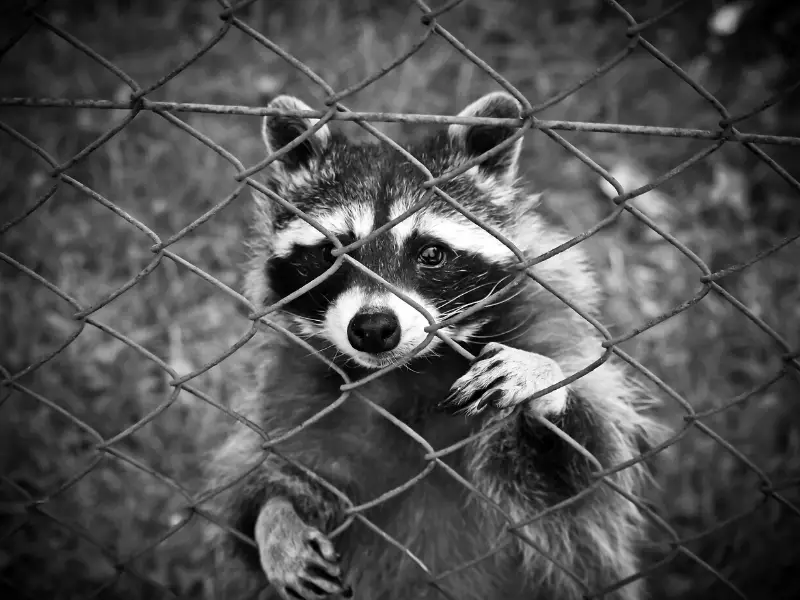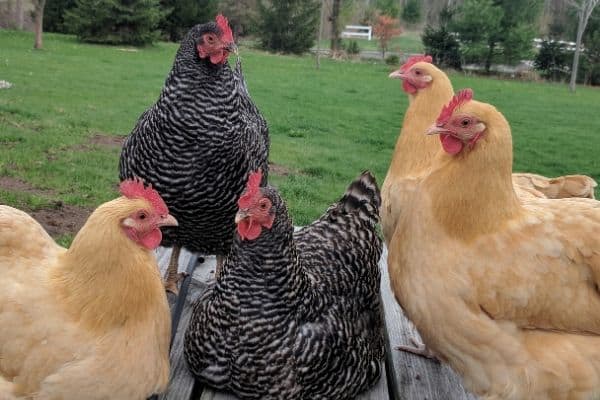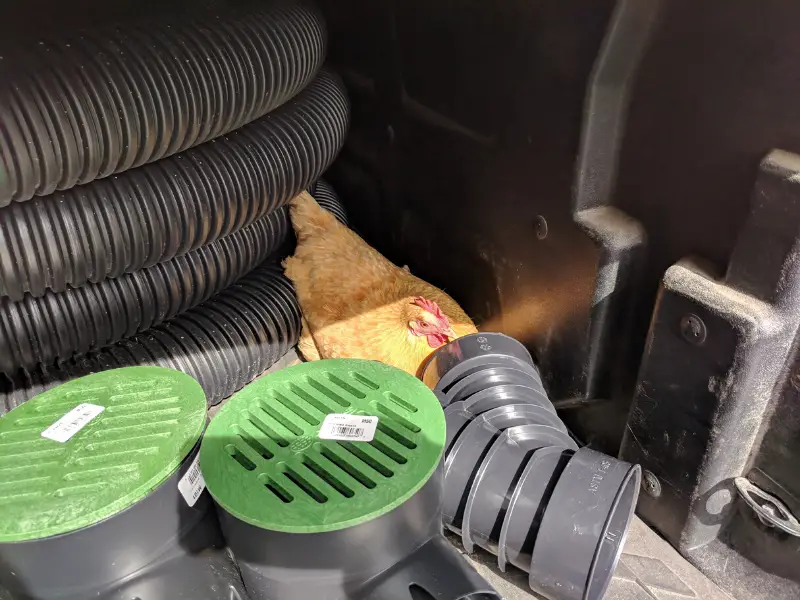When you finally decide to add chickens to your homestead, there are a ton of questions you’ll have to answer. Along with their care and maintenance, you’ll want to consider the impact the chickens will have on the environment, and what they might be attracting from beyond your fence line.
Do chickens attract pests and wildlife? Yes and No. Chickens do attract certain forms of wildlife and pests. However, in some instances, it’s not necessarily the chickens that attract wildlife, but the environment in which the chicken lives.
So, if the chickens’ environment piques the interest of certain forms of wildlife, and the chickens themselves entice particular creatures, what could be their motives? It’s an exciting journey we are about to embark on. There is much to discover concerning chickens and their habitats, as well as the effect they have on nature and its natural cycle. Let’s explore the law of attraction to chickens and their coops.
Do Chickens Attract Rats?
No. The environment is actually what attracts the rats. Coops that are poorly built and not taken care of can be an invitation for rats. Rats are more attracted to a chicken’s food, water, and even the eggs. Chicken coops are associated with mild to severe rodent infestations.
Rats and house mice are not only predators of baby chickens and eggs. They also carry and transmit diseases to both chickens and humans. Rats can climb and even jump. Typically, though, they try to get into a chicken coop by digging or chewing their way in.
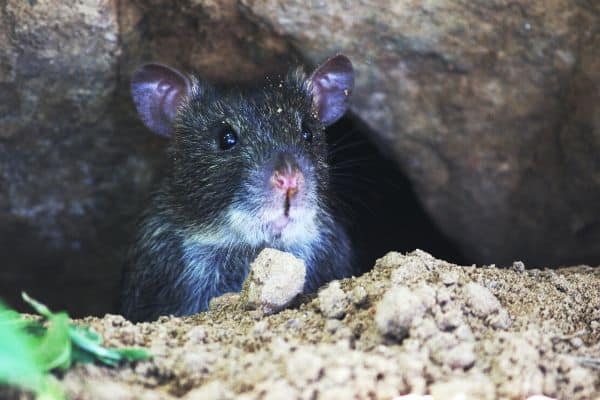
The owner of the chicken coop needs to stay proactive and prevent potential problems or issues due to rats. This includes sanitation around the coop. Rats take a liking to the sources of food and water around the chicken coop, so it’s important to limit these attractive items. One can do this in a few different ways.
How to Deter Rats from the Coop
If possible, removing the chicken food at night is a good proactive measure. If not, using a rat-proof container made from either heavy-duty metal or plastic will work. Keeping the chicken coop as clean as possible is also a factor. This includes removing any spilled grain that may attract these rodents.
A chicken farmer also doesn’t want to leave eggs in the coop overnight because eggs are an excellent source of food for the rats. It’s also important to remove water from the chicken coop at night and then replenish it in the morning if rats and mice seem to be a problem.
Clearly, it’s also crucial to repair any openings to the chicken enclosure to make sure mice and rats can’t get through. Well-constructed, hard materials make it difficult for rodents to gnaw their way in.
A chicken coop owner can also use trapping methods and rodenticide. It’s important to note, though, that chickens will eat rodent carcasses and are known to catch live mice. Therefore, this makes restricting their access to rats that may have ingested rodenticide a top priority. This can be harmful to chickens. If consumed by the chickens, they will get rodenticide secondarily, otherwise known as secondary toxicosis.

What Animals Do Chickens Attract?
Baby chicks may be cheap to buy, but over the long haul you will invest a quite a bit of money into them. Free-range or pastured eggs in the store can cost upwards of $5-$6 a dozen. This is because of the time and money spent on food, watering equipment, coop build and upkeep, etc.
To protect that investment a group of chickens must be protected from potential predators. This is a crucial aspect of the raising and owning of chickens. They tend to serve as easy prey for several predators. A flock of chickens is a very enticing invitation to a wide range of animals.
Signs of Predation
Coyotes and Foxes will often eat an entire chicken, leaving little evidence that they were ever-present. The “fox in the hen house” usually climbs or digs its way through to kill them or take with them what they can. They leave feathers and sometimes blood, as the only proof they were ever there.
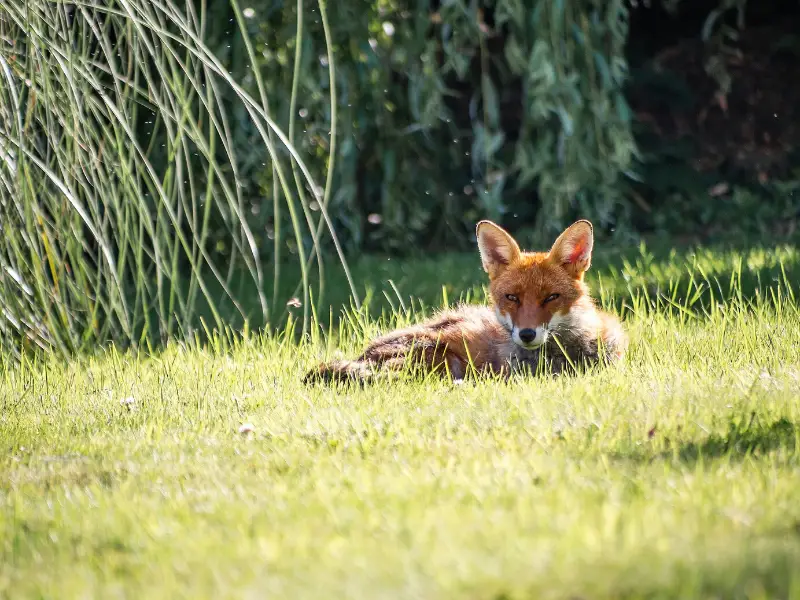
Raccoons attack chickens by biting at the neck or head. They will consume parts of it onsite, then they will drag it away, but only a short distance. Finding multiple chickens dead around the coop may be a sign of a raccoon. A family of raccoons can wipe out the entire flock as happened to us on our first attempt at chicken-keeping. Watch the video below to see our I improved the predator protection of our coop.
Opossums will attack the chicken with its claws. They don’t often kill more than a bird or two at the most. This is because they only feed on what they need to fill their stomachs up. Once they know where an easy meal is found they will be back unless stopped.
Hawks, on the other hand, will carry off their prey without a trace that they were ever at the coop. Even if you catch a hawk trying to kill one of your flock, it’s illegal to kill or trap a hawk without a permit. This is because they are federally protected. We use a netting over the fenced in run, but that doesn’t help when they are out free-ranging.
Owls will eat the chicken whole and then regurgitate the bones and feathers. Finding these leftovers may be a sign of an owl attack, but they usually carry the bird off somewhere else. Owls just like hawks are federally protected. I believe we have lost a chicken to an owl. The girls all were locked in the pen at night but I didn’t shut the small coop door. The next morning there was one chicken missing. I never found any trace of her and, but my guess is an owl came right into the coop and got her.
Although dogs typically kill more for sport, they attack chickens by biting them, then violently shaking them to death. Sometimes it is more accidental that they are just chasing and playing around than trying to kill, but a chicken that gets scared like that from a dog can die from a stroke or heart attack rather than by a dogs jaws.
Some are just ruthless though. I had a neighborhood dog that cornered one of the hens in the pen and ran off so fast with her that I couldn’t catch him. I saw the whole thing happen. That dog is a menace of the neighborhood.
Cats, by contrast, tend to steer clear of larger hens and roosters. But small hens and chicks are definitely included in their diet. When attacking, they will use their razor-sharp claws and piercing teeth to grab them by the neck.
Unlike any other predator, bears have the strength to destroy the entire chicken coop. The coop, as well as any leftover chicken parts, will be scattered throughout the yard. A hungry bear is a difficult critter to deter. You could try electric fencing if you live in an area with bears.
Protecting Your Chickens from Predators
In order to offer full protection from these predators attacking these chickens, precaution must be taken to secure all sides of both the coop and the run. This article also on this same site covers this in more detail.
It’s important to note that if the coop owner has a cat or a dog, they need to be trained around the chickens. Pets that are raised and trained around chickens can be beneficial to deter predators that are on the prowl looking for a food source. However, until fully trusted pets may need to be kept separated from the flock when your not out with them.
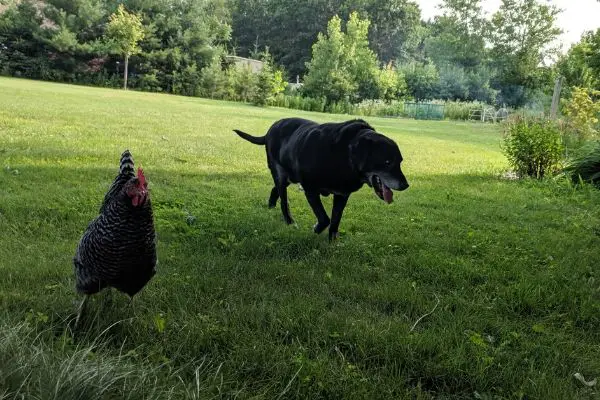
What Kind of Insect Pests Do Chickens Attract?
Chickens do tend to “rule the roost” as much as possible. However, if a pest infestation menacingly strikes the coop territory, nurturing the chickens back to health, can be a challenge. Importantly, chickens are pretty sharp at hiding signs of weakness, so the owner might just miss the fact that they are under attack by these aggravating little pests.
Ticks
Those darn blood-sucking ticks can discreetly feed on the chickens. A discovery of poultry tick or fowl tick can be found by taking a close look at the coop itself. These pests will hide in the crevices of a coop structure and come out at night in order to feed. Chicken farmers will also find the tell-tell sign of the ticks bothering the birds are hesitant to go inside the coop at night and appear to be flustered when they try to roost.
Chickens will eat ticks and can help control them around the homestead, but that doesn’t mean they are completely safe from being bitten. Allowing the chickens access to a dirt pile for dust baths will help keep the bugs off.
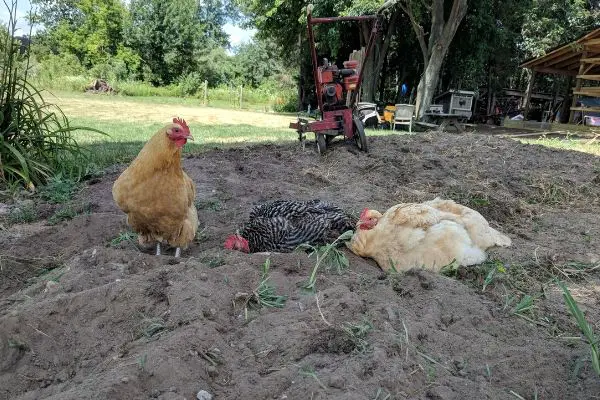
Fleas, Lice & Mites
According to Entomology Today chickens are prone to getting lice, mites and fleas. A coop infestation of this parasites makes the bird’s life completely wretched. Just like poultry ticks, they will hide during the day in dark coop crevices and come out to devour the chicken’s blood at night. This causes chickens to stop their production of eggs and to scratch and over-preen. Examining the chickens at night while they roost is the way to discover these pests crawling around on them.
Other Bugs
Flies are another type of insect pest that are attracted to chicken coops. The most common types of flies that will invade a coop are house flies and stable flies. Their attraction is aimed towards fresh feces. They can harm to chickens with open sores, so chickens that are being pushed around have missing feathers and wounds are the most vulnerable. If the chicken has diarrhea, some flies lay on the chicken vents.
On the other hand, if ants are present in the coop, it’s probably because the chickens are fed fresh food. Ants are professionals at locating a fresh food source. They are also drawn to broken eggs, and they will overrun a coop not long after the egg has broken. Ants are not known to harm a healthy chicken. However, they do tend to attack young chicks and even the sick or injured by biting them.
Preventing a Pest Infestation
Some common fixes to the issues resulting from these pests are pretty simple.
With ticks, for instance, you can caulk the crevices. For mites and lice, you can use a 3 to 1 bleach solution. Keep the flies away by regularly changing the coop bedding. Finally, for ants, remove any uneaten fresh food after the chickens have walked away and clean up any broken eggs as quickly as possible. Also, if the ants are congregating in the coop, spray them with a 1 to 1 vinegar solution.
Can Humans Catch Anything from Chickens?
Owners should be aware that chickens can sometimes carry harmful germs that can make people sick. The germs carry a plethora of illnesses in people varying from minor skin infections to serious illnesses that could even cause death. When owning a coop, it’s important to know the risks of keeping poultry and the simplest things that can be done to stay safe.
Avian influenza, which is better known as bird flu, is caused by influenza viruses. It’s a contagious respiratory illness. Moreover, birds can be infected with flu viruses and not show any symptoms. Signs of infection in the chickens range from decreased egg production to unusually high death rates.
Campylobacter is bacteria that has the potential to make people and chickens sick with a disease known as campylobacteriosis. These bacteria most often spread to animals and people through the feces of infected chickens, contaminated food, or the environment. If people don’t wash their hands after touching the chicken, it’s poop, or it’s a coop, they can get infected. Unfortunately, even if a chicken looks healthy, they can still spread the bacteria to people.
Escherichia coli, better known as e. Coli, can make people sick, but most strains are harmless. It most commonly spreads to animals and people through the poop of infected animals, contaminated food, or the environment. If people touch the animal or its feces without washing their hands after, they run the risk of infection in poultry, e. Coli is found naturally, usually with no signs of illness. That being said, if the chicken looks healthy, it could still spread the bacteria.
Salmonellosis is a disease caused by salmonella. People get infections from salmonella every year from handling poultry. Also, chickens don’t show signs of being infected. A person could acquire this from a healthy-looking bird or their eggs.
The Center for Disease Control recommends washing hands thoroughly to prevent contracting disease from chickens along with maintaining a clean and healthy environment for them.
How to Keep Chickens Healthy
Clearly, it’s important to keep the chickens healthy and to thrive in their coop. To do this, there are some simple guidelines to follow to keep people and their chickens safe from disease. As long as the chickens are taken care of properly, they can stay amazingly healthy.
However, they are susceptible to many diseases. Some are threatening and infectious that they can quickly destroy a flock. People must work at learning to prevent these deadly chicken diseases from causing sickness in the birds and even death.
Keeping chickens healthy requires providing them with a clean-living environment, nutritious food, clean water, and confinement from pathogens.
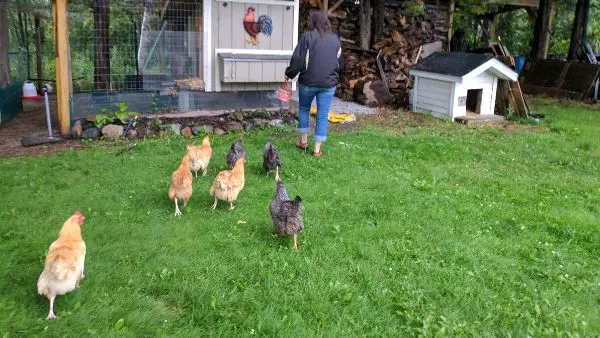
Maintaining a healthy flock is also key. When chickens are cramped together in a moist, dirty house, they are favorable for disease. Some fixes for this include giving the chickens some room. Overcrowding actually encourages egg eating, cannibalism, fighting, odor, and even disease. So, the more space that they have, the better.
Keeping the chickens and the coop dry is essential. Once the food gets wet and smelly, then bacteria begin to multiply.
It’s also an essential part of their nutrition to be well fed with fresh high quality chicken feed. To optimize a balanced diet, they will benefit from having access to pasture or even the backyard to pick at fresh greens and bugs. Particularly, it’s also important to protect them from the different forms of wildlife and pests that were mentioned above.
It’s important to keep clothing and shoes clean. Even the tiniest scraps of manure and dirt can attach to pants and shoes that can bring disease to a flock. It’s equally important to clean the feeders and waterers regularly. Also, limiting the flock’s exposure to wild birds and mice, as they may carry pathogens.
According to Poultry Hub, Vaccination plays an important part in the health management of the poultry flock. It’s not possible to vaccinate chickens to prevent all diseases. However, it will prevent a few common diseases.
Are Chickens Dirty Pets?
Chickens are, in fact, clean animals. When not receiving proper care, neglected chickens can always lead to an unsanitary environment. Flies, disease, and odors quickly develop from lack of care. A small flock, however, can be pretty easy to maintain. Their actual level of cleanliness is based on the owner’s efforts to take care of them. Chickens kept in unclean areas can and will get sick. This is why a clean environment should be the owner’s top priority.
Even with the slightest amount of care, the flock can be relatively clean and healthy. It is important to note that chickens will walk through their own waste. However, they are completely unaware of what their feet are actually touching. Animals in general that are not properly cared for often receive the title of the dirtiest animal. This is a stigma with chickens, particularly.
Is it Safe to Keep Chickens in the House?
Chickens can actually be quite entertaining little creatures. However, they are not like owning a pet dog or cat. Unquestionably, chickens should not be kept inside a home. They are not littered trained. Although they do have chicken diapers out for sale now, it still doesn’t make it a healthy environment for a family to live in.
Also, it’s important to note that chickens do flap those wings of theirs quite a lot. This makes dust that resides on their bodies easily spread throughout a house. A person certainly does not want to be exposed to concentrated amounts of whatever might be existent on a chicken’s body. This would, of course, include fecal matter or even mites.
Chickens Need an Owner’s Dedication
Once a flock is set up well and running smoothly, they only require about a half an hour or less of the owner’s time each day. Indeed, to get to know the hens well, they need much of that time spent with them while they are still young. Summer months are imperative to needing prompt attention. As stated before, dirty, coops that are not cared for lead to disease, death of birds, and of course, the possible rodent infestation and swarms of flies.
If you have close neighbors, they may have concerns of your chickens attracting rodents or other pests. However, keeping the food stored securely should relax any concerns the folks next door may have. An occasional peace offering of a dozen fresh eggs might help too.
To be fully dedicated to raising chickens, a person cannot be in ill health. If they suffer from allergies or respiratory issues, they may be put at a higher risk and should take some time for serious thought given to the purchase of them.


